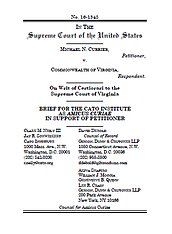Currier’s conviction is squarely in conflict with the Double Jeopardy Clause of the Fifth Amendment. That provision guarantees that no person shall be “twice put in jeopardy of life or limb” for the same offense, and includes the principle that when an issue of ultimate fact has necessarily been determined by a jury acquittal, the government cannot relitigate the same factual question in a second trial for a separate offense. Given how Currier’s charges were tried the first time, the jury necessarily concluded that he wasn’t guilty of participating in the underlying burglary and theft—he simply wasn’t there at all. But that’s the exact same set of facts the government needed to obtain a conviction in the second trial, because Currier was only alleged to have “handled” the guns in the course of the robbery.
The Commonwealth justifies this result by arguing that Currier waived his double-jeopardy rights by agreeing to severance, and that there was no blatant prosecutorial misconduct. But this position would deprive the Double Jeopardy Clause of much of its significance, and is inconsistent with the historical development of double jeopardy jurisprudence in the United States—in particular, its goal of guarding against the structural power imbalances that exist between prosecutors and defendants. It is also impossible to square the Commonwealth’s position with the sanctity of jury acquittals and the time-honored authority and prerogative of the jury, speaking for the community, to ultimately and finally determine facts.
If the Commonwealth’s position becomes the law of the land, the government will be further incentivized to charge more offenses based on the same underlying conduct, thus increasing the need for (and likelihood of) multiple trials for the same underlying series of events. This type of overreach will allow the government to run dress rehearsals for successive prosecutions in more and more cases, thereby undermining the sacred liberty interests protected by the Double Jeopardy Clause, and diminishing the responsibility of the jury to stand between the accused and a potentially arbitrary or abusive government. This result would be a travesty; in today’s world of ever-expanding criminal codes and regulatory regimes, the government needs fewer, not greater, incentives for piling on theories of criminal liability.
